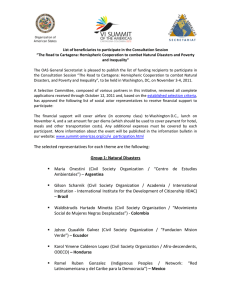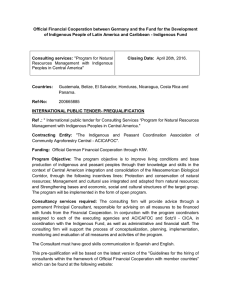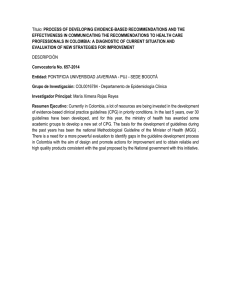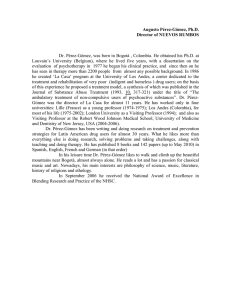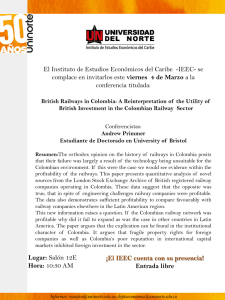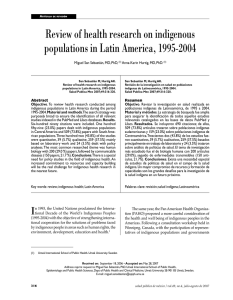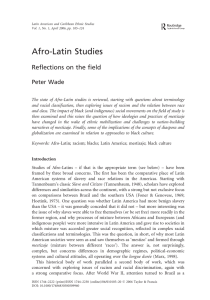Recommendations for the governments of Latin America and
Anuncio
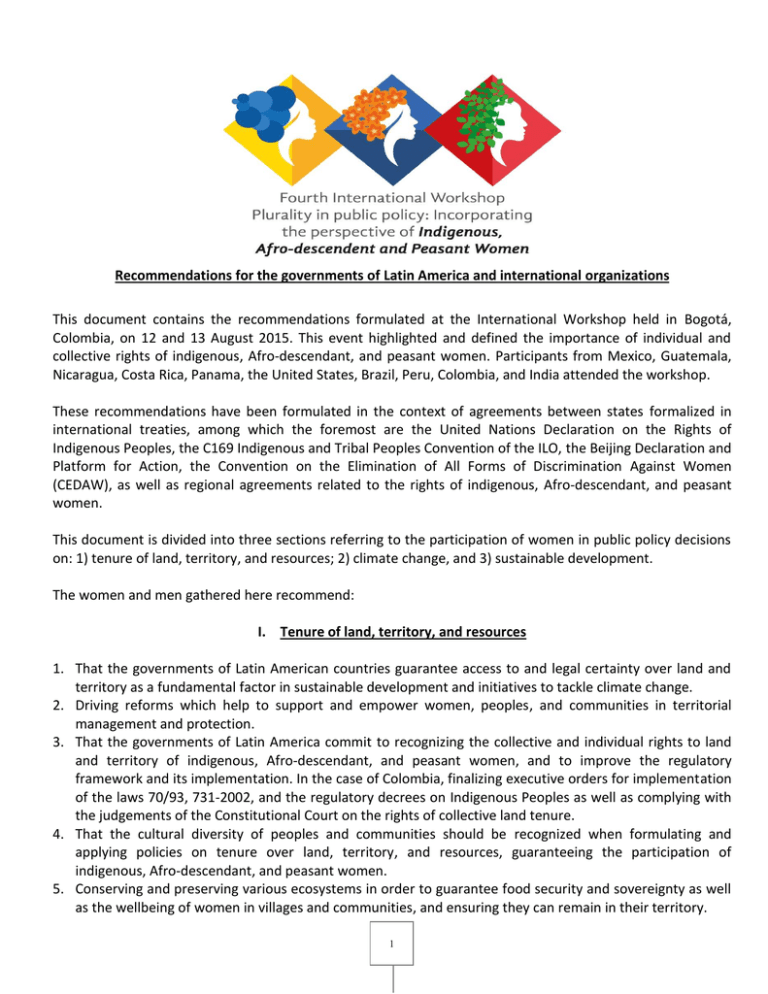
Recommendations for the governments of Latin America and international organizations This document contains the recommendations formulated at the International Workshop held in Bogotá, Colombia, on 12 and 13 August 2015. This event highlighted and defined the importance of individual and collective rights of indigenous, Afro-descendant, and peasant women. Participants from Mexico, Guatemala, Nicaragua, Costa Rica, Panama, the United States, Brazil, Peru, Colombia, and India attended the workshop. These recommendations have been formulated in the context of agreements between states formalized in international treaties, among which the foremost are the United Nations Declaration on the Rights of Indigenous Peoples, the C169 Indigenous and Tribal Peoples Convention of the ILO, the Beijing Declaration and Platform for Action, the Convention on the Elimination of All Forms of Discrimination Against Women (CEDAW), as well as regional agreements related to the rights of indigenous, Afro-descendant, and peasant women. This document is divided into three sections referring to the participation of women in public policy decisions on: 1) tenure of land, territory, and resources; 2) climate change, and 3) sustainable development. The women and men gathered here recommend: I. Tenure of land, territory, and resources 1. That the governments of Latin American countries guarantee access to and legal certainty over land and territory as a fundamental factor in sustainable development and initiatives to tackle climate change. 2. Driving reforms which help to support and empower women, peoples, and communities in territorial management and protection. 3. That the governments of Latin America commit to recognizing the collective and individual rights to land and territory of indigenous, Afro-descendant, and peasant women, and to improve the regulatory framework and its implementation. In the case of Colombia, finalizing executive orders for implementation of the laws 70/93, 731-2002, and the regulatory decrees on Indigenous Peoples as well as complying with the judgements of the Constitutional Court on the rights of collective land tenure. 4. That the cultural diversity of peoples and communities should be recognized when formulating and applying policies on tenure over land, territory, and resources, guaranteeing the participation of indigenous, Afro-descendant, and peasant women. 5. Conserving and preserving various ecosystems in order to guarantee food security and sovereignty as well as the wellbeing of women in villages and communities, and ensuring they can remain in their territory. 1 II. Climate Change 1. That the governments of the countries of Latin America guarantee and implement the allocation of financial resources to promote activities for the adaptation and mitigation of climate change in a transparent manner that allows their implementation to be monitored. These activities must incorporate the knowledge and wisdom of indigenous, Afro-descendant, and peasant women. 2. The governments of Latin America must show transparency in agreements and understandings on international cooperation regarding financing mechanisms to combat climate change and reduce deforestation and degradation, as well as the emission of greenhouse gases. Likewise they must prioritize financing to train and support indigenous, Afro-descendant, and peasant women so that they may participate in the decision-making process on these mechanisms from their different points of view. 3. That fundamental rights to free, prior, and informed consent be guaranteed in climate change policies and REDD+ initiatives in accordance with the provisions in the United Nations Declaration on the Rights of Indigenous Peoples; and to ensure the participation of indigenous, Afro-descendant, and peasant women in the decision-making process for plans, programs, and projects directed towards the adaptation and mitigation of climate change. 4. Promoting and highlighting the existing coordination and articulation of meeting grounds for dialogue and negotiations with governments, at varying levels, in the decision-making process on public policy regarding climate change and gender equality. 5. That the governments of Latin America recognize, monitor, and penalize the negative impact on nature, peoples, and communities resulting from mining and extraction licenses, megaprojects, and monocultures. Reversing this damage; guaranteeing social, economic, and environmental investments as compensation; and not granting exploratory rights in protected areas or in indigenous, Afro-descendant, or rural communities. 6. Drawing up public policies to create differentiated mechanisms to tackle the driving forces behind deforestation on a large and small scale. 7. Recognizing, respecting, and promoting the knowledge and traditional practices of women in managing nature as tools for the adaptation and mitigation of climate change, and incorporating them into public policies. 8. Institutionalizing at all levels the proposals and international agreements of governments on climate change, and implementing communication strategies for the distribution of technical and scientific information on climate change and REDD+ initiatives to indigenous, Afro-descendant, and peasant women in a differentiated manner. III. Sustainable Development 1. That the governments of Latin American countries guarantee the participation of indigenous women, women of African descent, and peasant women in decision-making processes, and in the formulation, execution, and monitoring of public policies for development at all levels, incorporating an intercultural and gender focus. 2. That governments, via their national statistics offices, incorporate specific questions on indigenous, Afrodescendant, and peasant women, with data disaggregated by gender in the official processes for collecting data. 3. That the governments of Latin American countries recognize the contribution made by indigenous, Afrodescendant, and peasant women to the national economy, including non-remunerated work. 4. That governments and organizations of international cooperation establish mechanisms to protect economic initiatives led by peoples and communities as well as the market access of indigenous, Afro2 descendant, and peasant women. Likewise, that they encourage innovative initiatives started at a local level. 5. Recognizing indigenous, Afro-descendant, and peasant women as legal subjects, agents for transformation, and political actors with different worldviews. We, the women and men participating in this workshop, declare our solidarity and support to the peace process in Colombia. 1. FEDERACIÓN DE MUJERES CAMPESINAS DE CUNDIMARCA (FEDERATION OF PEASANT WOMEN OF CUNDIMARCA) - FEDEMUCC - COLOMBIA 2. PONTIFICIA UNIVERSIDAD JAVERIANA (PONTIFICAL XAVERIAN UNIVERSITY) - COLOMBIA 3. INICIATIVA PARA LOS DERECHOS Y RECURSOS (RIGHTS AND RESOURCES INITIATIVE) - RRI 4. MESA DE INCIDENCIA POLÍTICA DE LAS MUJERES RURALES COLOMBIANAS (RURAL COLOMBIAN WOMEN POLICY IMPACT GROUP) - COLOMBIA 5. ORGANIZACIÓN DE PUEBLOS INDIGENAS DE LA AMAZONIA COLOMBIANA (ORGANIZATION OF INDIGENOUS PEOPLES OF THE COLOMBIAN AMAZON) - OPIAC - COLOMBIA 6. COMISION DE DERECHOS HUMANOS – INSTITUCIÓN TAYRONA (HUMAN RIGHTS COMMISSION - TAYRONA INSTITUTION) - COLOMBIA 7. AUTORIDAD NACIONAL AFROCOLOMBIANA (AFROCOLOMBIAN NATIONAL AUTHORITY) - ANAFRO COLOMBIA 8. “MANO CAMBIADA” CORPORACION (“MANO CAMBIADA” CORPORATION) - COLOMBIA 9. ASOCIACIÓN DE LAS MUJERES INDÍGENAS DE LA COSTA CARIBE (ASSOCIATION OF INDIGENOUS WOMEN OF THE CARIBBEAN COAST) - NICARAGUA 10. EJIDO TOPIA DE DURANGO (COMMON LAND IN TOPIA, DURANGO) - MEXICO 11. CONSEJO CIVIL MEXICANO PARA LA SILVICULTURA SOSTENIBLE (MEXICAN CIVIL COUNCIL FOR THE SUSTAINABLE SILVICULTURE) - MEXICO 12. UNIÓN NACIONAL DE MUJERES KUNAS (NATIONAL UNION OF KUNA WOMEN) - PANAMA 13. GRUPO DE MULHERES NEGRAS MÃE ANDRESA (MOTHER ANDRESA BLACK WOMEN’S GROUP) - BRAZIL 14. ASOCIACIÓN TIKONEL (TIKONEL ASSOCIATION) – GUATEMALA 15. ORGANIZACIÓN NEGRA CENTROAMERICANA (CENTRAL AMERICAN BLACK ORGANIZATION)- ONECA NICARAGUA 16. CENTRO PERUANO DE ESTUDIOS SOCIALES (PERUVIAN CENTER FOR SOCIAL STUDIES) – CEPES – PERU 17. ASOCIACION INTERÉTNICA DE DESARROLLO DE LA SELVA PERUANA (INTERETHNIC ASSOCIATION FOR THE DEVELOPMENT OF THE PERUVIAN RAINFOREST) – AIDESEP - PERU 18. CENTRAL ASHANINKA DE RIO ENE (HEAD OFFICE OF THE ASHANINKA OF THE ENE RIVER) – CARE – PERU 19. ORGANIZACIÓN NACIONAL DE MUJERES ANDINAS Y AMAZONICAS DEL PERÚ (NATIONAL ORGANIZATION OF ANDEAN AND AMAZONIAN WOMEN OF PERU) – ONAMIAP - PERU 20. ROCIO MUÑOZ FLORES - INDEPENDENT CONSULTANT - PERU 21. ASOCIACIÓN DE COMUNIDADES FORESTALES DE PETEN (ASSOCIATION OF FOREST COMMUNITIES OF PETEN) - GUATEMALA 22. ASOCIACION DE MUJERES CAMPESINAS DE CAMPO El CAMBULO, ASOMUCAM – COLOMBIA 23. SINDICATO DE AGRICULTORES DE ARAUCA, SINDEAGRO – COLOMBIA 24. MOVIMIENTO DE MUJERES POR LA PAZ (MOVEMENT OF WOMEN FOR PEACE) – COLOMBIA 3 Government officials present during the delivery of recommendation on AUGUST 14 1. JUAN PABLO CORAL – ASUNTOS ETNICOS, MINISTERIO DEL INTERIOR (ETHIC AFFAIRS OF THE MINISTER OF THE INTERIOR) – COLOMBIA 2. GABRIELA MUÑOZ - CONSEJERIA PRESIDENCIAL PARA LA EQUIDAD DE LA MUJER (PRESIDENTIAL OFFICE FOR WOMEN’S EQUALITY) – COLOMBIA 3. RAQUEL VICTORINO - DIRECTORA SOCIAL UNIDAD DE RESTITUCIÓN DE TIERRAS (SOCIAL DIRECTOR OF THE LAND RESTITUTION UNIT) – COLOMBIA 4. CLARA ROJAS - REPRESENTANTE A LA CAMARA (REPRESENTATIVE IN THE CHAMBER OF REPRESENTATIVES) – COLOMBIA 5. LUNA CASTAÑO- VICEMINISTERIO DE AGRICULTURA Y DESARROLLO (VICEMINISTRY OF AGRICULTURE AND RURAL DEVELOPMENT)-COLOMBIA 6. GLORIA FLOREZ - SECRETARIA DE GOBIERNO – ALCALDIA MAYOR DE BOGOTÁ (GOVERNMENT SECRETARY - MAYOR’S OFFICE OF BOGOTÁ) – COLOMBIA 7. PILAR VIDAL- SUBGERENCIA DE PROMOCION, SEGUIMIENTO Y ASUNTOS ETNICOS, INCODER, (ASSISTANT DIRECTOR OF PROMOTION, MONITORING AND ETHNIC AFFAIRS, INCODER)-COLOMBIA 8. MARTA ORDONEZ- PRESIDENTIAL ADVISOR (ATTENDED THE EVENT ON AUGUST 12) 4
